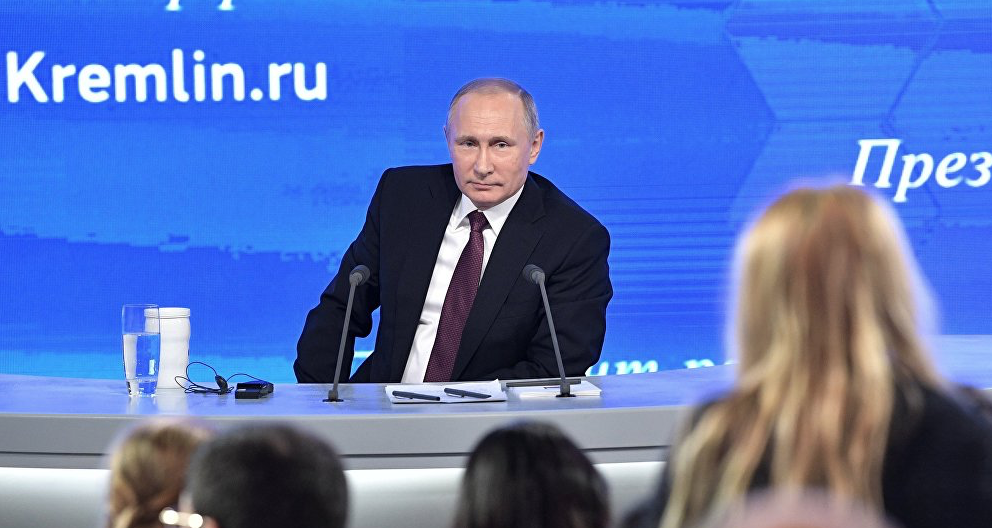CommentsGELFAND'S WORLD-This doesn't take long to say. There is a good reason to have freedom of the press, and the obvious corollary is that it has to be accompanied by free and fair elections.
Our latest example comes from a press conference held by Vladimir Putin in Geneva, Switzerland the other day, right after he met with U.S. President Joe Biden. You can find the whole thing online here. The interesting part begins right at 32:27 in this video recording, where ABC correspondent Rachel Scott gets the microphone. After a throw-away question on cyber security, she asks what she calls a follow up question:
"The list of your political opponents who are dead, imprisoned, or jailed is long. Alexey Navalny's organization calls for free and fair elections, an end to corruption, but Russia has outlawed that organization, calling it extremist and you have now prevented anyone who supports him to run for office, So my question is, Mr President: what are you so afraid of?"
I won't provide a transcript of Putin's response (which is given as simultaneous translation in the video), but it is clear that we and Putin are talking at cross purposes. Most of his responses (including to other questions from other reporters) go to claims that America is the actual bad guy, and that Russia is just upholding its own laws and keeping the peace in its own country. More about his arguments later, but let's take Scott's follow up:
""You didn't answer my question sir. If all of your political opponents are dead, in prison, poisoned -- doesn't that send a message that you do not want a fair political fight?"
Indeed. When did you stop beating your wife, or in this case, your political opponents?
Mostly, you want to ask if this is really true, and if so, why isn't there even more worldwide revulsion over the failure of modern Russia to evolve away from the Soviet model? I don't think there is a lot of question about it being true. The underlying question might be how Putin and the Russian oligarchy keep in control to an extent not far different from what existed during the Soviet dictatorship.
But there shouldn't be much of an issue to Americans that we prefer the idea of political freedom. The problem for some of us is that freedom of speech and of the press has the additional correlate of free and fair elections. The two seem to go together. And we might add that in order to maintain those freedoms, we have to constrain government from otherwise oppressing its citizens through dishonest criminal prosecutions. Out of that we realize that we have to defend the rest of the Bill of Rights, including the fact that every person is entitled to a fair trial should he be charged with something.
That of course is where the question about Alexey Navalny came in, and where Putin demonstrated how distant he is from any of this line of thought.
And this is where the rest of the story has to be brought back.
In 2017, Donald Trump called our major media the enemy of the American people.
Here is the original Tweet:
"The FAKE NEWS media (failing @nytimes, @NBCNews, @ABC, @CBS, @CNN) is not my enemy, it is the enemy of the American People!"
"— Donald J. Trump (@realDonaldTrump) February 17, 2017"
The idea is as dangerous as it is preposterous. In his book On Tyranny, Timothy Snyder warned that attacks on the legitimacy and the freedom of the press are a predictable element of attempted fascist takeovers. This is not to say that presidents will occasionally become irritated with reporters and columnists -- Harry Truman famously said something rather profane about a reporter who criticized his daughter's piano recital -- but that is different from our traditional recognition that finding out the facts and making them public is a necessary part of maintaining the democratic process.
But the story of the Putin press conference goes even further still. Allow me to cite a Washington Post column by Dana Milbank, which you can find here. In this column, titled "The absurdity of Putin's lies should be obvious. Thanks to Trump, it isn't" MIlbank goes through Putin's responses to questions put by the reporters and shows that Putin was merely reciting Trump talking points. Putin refers to the Black Lives Matter protests as if they were nothing but a national orgy of rioting, burning, and looting, an argument Trump made in the desperate attempt to win reelection.
Putin also talked about the Capitol riot and takeover as if it were an ordinary political protest (Milbank's term) and spoke of the arrests and criminal charges as if they were something comparable to his persecution of Navalny.
Those of a certain age will remember how Soviet leaders and their ambassadors would always answer criticisms of their own country with attacks on what was going on in the United States. Modern pundits have developed a term for this approach: "Whataboutism." It's just as illogical now as it was then, because finding something to criticize about American history does not absolve Russian dictators of their own crimes.
What is interesting about Milbank's column is that he ties this exercise in Russian propaganda by its demonstrably murderous dictator with the current party line espoused by Donald Trump and by his enablers in the U.S. Congress. The Republicans have given Putin plenty of ammunition for his current lies. Putin even went so far as to express his sympathy to the United States for our troubles. That is taking concern trolling to a new depth.
(Bob Gelfand writes on science, culture, and politics for CityWatch. He can be reached at [email protected])
















